Balihamzehdeh salvages tough day for Iran at Asian Championships
Monday, April 10, 2023 - 16:58 By Ken Marantz

ASTANA, Kazakhstan (April 10) -- Compared to the previous day, things could not have gone more differently for Iran. But Mehdi BALIHAMZEHDEH (IRI) salvaged some national pride by successfully defending his 97kg title in the final match of the Greco-Roman competition at the Asian Championships on Monday.
Balihamzehdeh forged out a dramatic 7-4 victory over Uzur DZHUZUPBEKOV (KGZ) in the 97kg final, giving Iran its lone gold of the day after winning four on the opening day Sunday at the Zhaksylyk Ushkempirov Martial Arts Palace in Astana.
It was Kyrgyzstan's turn to shine as all five of its wrestlers made it onto the medal podium, with world champion Zholaman SHARSHENBEKOV (KGZ) repeating as 60kg champion and Akylbek TALANTBEKOV (KGZ) triumphing at 82kg.
Ibragim MAGOMADOV (KAZ), a silver medalist three years ago, gave the host country its first gold medal of the tournament with a victory at 72kg, while Abror ATABAEV (UZB) assured that Uzbekistan would take home a Greco-Roman gold for the fifth straight year by storming to the 67kg title.
Iran, which also added a silver medal and a bronze medal to its tally, rode its big lead from the opening day to the team title with 196 points. Kyrgyzstan's second-day onslaught lifted it into second with 166, six points ahead of host Kazakhstan.
While the team title wasn't at stake, Balihamzehdeh's victory over Dzhuzupbekov in the 97kg final had all the drama of a crucial match.
The two had met twice last year, with Balihamzehdeh coming out on top both times in close decisions. First, the Iranian won 4-1 in the semifinals at the Asian Championships in Mongolia, then edged Dzhuzupbekov 3-3 at the World Cup in Baku seven months later.
On Monday, Balihamzehdeh struck first, gaining a passivity point, a stepout and a takedown, only to see Dzhuzupbekov score a takedown in the final seconds of the first period to cut the lead to 4-2 at the break.
In the second period, Dzhuzupbekov, who last year won his third senior Asian bronze, put himself on course for his first gold when a stepout and fleeing penalty put him ahead on criteria 4-4 with 1:30 left.
The tension was at a fever pitch as the clock wound down to :26, when both wrestlers were treated for bleeding, a sign of the intensity of the clash. Balihamzehdeh had his head taped to stop external bleeding from his ear, while Dzhuzupbekov had a bloody nose.
With :15 left, Dzhuzupbekov was flagged for a 2-point head butt, and a lost challenge put Balihamzehdeh ahead 7-4 before he ran out the clock.
 Zholaman SHARSHENBEKOV (KGZ) defended his 60kg Asian title in Astana. (Photo: UWW / Kadir Caliskan)
Zholaman SHARSHENBEKOV (KGZ) defended his 60kg Asian title in Astana. (Photo: UWW / Kadir Caliskan)
Sharshenbekov's gold-striking triumph over Hanjae CHUNG (KOR) in the 60kg final had more dominance than drama.
He dazzled Chung with a spinning takedown that landed the Korean on his back for 4 points. Put on top in par terre Sharshenbekov used a high gut wrench to yank Chung up and over onto his back for another 4. Korea's challenge of the call, saying it should have only been for 2, was unsuccessful, giving Sharshenbekov a 10-0 technical fall in 1:46.
"I respect all of my opponents," Sharshenbekov said. "I think all of them are strong wrestlers. Everything was on a high level, I can say that it was hard."
The 23-year-old Sharshenbekov credited the immense support system around him for his success.
"If I say that I'm champion myself only it would be wrong, because there is a huge team supporting me," he said. "They work behind the scenes: our coaches, teammates, sparring partners, doctors who were checking the state of our health all the time, masseuse. I want to thank them all. I dedicate this gold medal to my Kyrgyzstan and my family."
Sharshenbekov and Chung met previously in the first round of the 2021 Asian Olympic qualifying tournament, with Sharshenbekov winning 6-2 en route to secure a spot at the Tokyo Olympics, where the three-time world medalist finished seventh.
 Akylbek TALANTBEKOV (KGZ) defeated Dias KALEN (KAZ) 3-2 in the 82kg final. (Photo: UWW / Kadir Caliskan)
Akylbek TALANTBEKOV (KGZ) defeated Dias KALEN (KAZ) 3-2 in the 82kg final. (Photo: UWW / Kadir Caliskan)
At 82kg, Talantbekov added the senior crown to the Asian U23 title he won last year with a nail-biting 3-2 win over Dias KALEN (KAZ), who had to settle for the silver medal for the second straight year.
Neither wrestler could budge the other from par terre and Kalen led 1-1 on criteria as the match went into its final minute. Talantbekov was put on top in par terre and managed to lift and roll Kalen, right after which Kalen scrambled behind for a reversal.
Kalen was originally awarded 2 points for a takedown, as the referee did not feel that his shoulders broke the 90-degree plane. The Kyrgyz side challenged the ruling, which was overturned and Talantbekov awarded the decisive points.
 Ibragim MAGOMADOV (KAZ) won the only Greco-Roman gold medal for Kazakhstan. (Photo: UWW / Kadir Caliskan)
Ibragim MAGOMADOV (KAZ) won the only Greco-Roman gold medal for Kazakhstan. (Photo: UWW / Kadir Caliskan)
Magomadov drew the biggest cheers of the night from the partisan crowd when he notched a solid 5-2 victory over Zagreb Open silver medalist Sajjad IMENTALABFOUMANI (IRI) in the 72kg final.
Magomadov took advantage of his chance at par terre in the first period, scoring with a pair of rolls to take a 5-0 lead. In the second period, Imentalabfoumani gained a passivity point, but was unable to turn the Kazakh. He added a stepout that was too little, too late.
In the 67kg final, Atabaev, last year's Asian U23 champion, added the senior continental title by storming to a 10-0 technical fall over Kyotaro SOGABE (JPN).
"I have been training a lot for this," Atabaev said. "It’s not even possible to describe how I feel. I’ve been dreaming of showing the result at the senior level. Now I made it."
Atabaev took the early lead when he stopped an arm throw attempt by Sogabe at the edge, getting 2 points after the original call of a stepout for the Japanese was changed upon challenge.
He then scored a standing roll from par terre for 4 and a 7-0 lead at the break. In the second period, Sogabe tried a desperation back-drop but Atabaev stuffed the move, landing Sogabe on his back for 2 and ending the match at 3:23. An unsuccessful challenge made the final score 10-0.
"I can’t say the evening was perfect, but still my performance was quite good," said Atabaev, who posted three technical falls, including one over former two-time Asian champion Almat KEBISPAYEV (KAZ) in the semifinals. "I had quite a tough match with Almat Kebispayev, the Japanese wrestler was strong as well, so it was quite competitive for me."
Japan grabs 3 bronzes; Kazakhstan, Kyrgyzstan 2 each
In bronze-medal matches, Japan had a big day by winning three, while Kazakhstan and Kyrgyzstan came away with two each.
Maito KAWANA (JPN) secured the title of the tournament's Comeback Kid after rallying from a big deficit for a second time, this time overcoming a six-point gap to defeat SUMIT (IND) on cautions with the score 14-6.
Kawana, who is hoping to challenge Tokyo Olympic silver medalist Kenichiro FUMITA (JPN) for the place on Japan's team at the World Championships, had a 4-point throw and received a number of penalty points as Sumit built up cautions, getting the third one that ended the match at 5:14. An unsuccessful challenge of the third caution made the final scoreline 14-6.
Earlier in the quarterfinals, Kawana fell behind 7-1 and 10-4 against Akmal KHAMROEV (UZB), but rallied to a wild 17-10 victory.
Perhaps noone was more pleased to make the medal podium than Yuta NARA (JPN), who hit a 4-point headlock throw in the second period to defeat Yiming LI (CHN) 5-2 at 97kg for his first medal in five trips to the Asian Championships.
Compatriot Yuya MAETA (JPN) also has not had much success abroad but secured an 82kg bronze with a 3-1 victory over Mukhammadkodir RASULOV (UZB) for his first senior Asian medal in four attempts. Maeta locked an arm and scored a gut wrench during his chance at par terre in the second period.
Krygyzstan got bronzes from Asian U20 silver medalist Razzak BEISHEKEEV (KGZ) at 67kg and Asian U23 champion Adilkhan NURLANBEKOV (KGZ) at 77kg.
Beishekeev opened with a 4-point hip throw en route to a 9-0 technical fall over Reza ABBASI (IRI), while Nurlanbekov held off Ali AL ABBOODAH (IRQ) for a 2-1 victory and his second straight senior Asian bronze. Nurlanbekov was able to get a 1-point stepout from his throw attempt from par terre for the decisive point.
The host country's Kebispayev will take home the fifth senior Asian medal of his career after the 35-year-old defeated Asian U20 bronze medalist Firuz MIRZORADZHABOV (TJK) 7-3 at 67kg.
Mirzoradzhabov had been aiming to earn just the eighth Asian medal in Greco-Roman in Tajikistan history.
Kebispayev compatriot Olzhas SYRLYBAY (KAZ) assured he would not leave empty-handed from his home tournament when he defeated Narinder CHEEMA (IND) 4-1. Syrlybay trailed 0-1 in the second period when he put together a stepout, a passivity point and a gut wrench to secure the win.
Both India and China went 1-for-3 in bronze-medal matches. In the lone direct confrontation between the two, world U23 bronze medalist VIKAS (IND) overwhelmed Jian TAN (CHN) by 8-0 technical fall in 1:41.
Liguo CAO (CHN) scored a takedown and a passivity point in the first period and held on for a 4-2 victory at 60kg over Yernur FIDAKHMETOV (KAZ), a bronze medalist from last year.
Zagreb Open champion Alireza MOHMADIPIANI (IRI) added a bronze to the Iranian till with a 5-1 victory over world U20 bronze medalist Rohit DAHIYA (IND) at 82kg. Dahiya made the rare choice of opting to remain standing when awarded a passivity point in the second period but could break through the Iranian's defenses.
Day 2 Results
Greco-Roman
60kg (11 entries)
GOLD: Zholaman SHARSHENBEKOV (KGZ) df. Hanjae CHUNG (KOR) by TF, 10-0 (1:46)
BRONZE: Maito KAWANA (JPN) df. SUMIT (IND) by Cautions, 5:14 (14-6)
BRONZE: Liguo CAO (CHN) df. Yernur FIDAKHMETOV (KAZ), 4-2
Semifinal: Zholaman SHARSHENBEKOV(KGZ) df. Maito KAWANA (JPN), 4-0
Semifinal: Hanjae CHUNG (KOR) df. Yernur FIDAKHMETOV (KAZ), 7-5
67kg (11 entries)
GOLD: Abror ATABAEV (UZB) df. Kyotaro SOGABE (JPN) by TF, 10-0 (3:23)
BRONZE: Razzak BEISHEKEEV (KGZ) df. Reza ABBASI (IRI) by TF, 9-0 (3:39)
BRONZE: Almat KEBISPAYEV (KAZ) df. Firuz MIRZORADZHABOV (TJK), 7-3
Semifinal: Kyotaro SOGABE (JPN) df. Reza ABBASI (IRI), 5-1
Semifinal: Abror ATABAEV (UZB) df. Almat KEBISPAYEV (KAZ) by TF, 10-2 (5:51)
72kg (13 entries)
GOLD: Ibragim MAGOMADOV (KAZ) df. Sajjad IMENTALABFOUMANI (IRI), 5-2
BRONZE: Adilkhan NURLANBEKOV (KGZ) df. Ali AL ABBOODAH (IRQ), 2-1
BRONZE: VIKAS (IND) df. Jian TAN (CHN) by TF, 8-0 (1:41)
Semifinal: Ibragim MAGOMADOV (KAZ) df. Ali AL ABBOODAH (IRQ), 6-0
Semifinal: Sajjad IMENTALABFOUMANI (IRI) df. Jian TAN (CHN) by TF, 9-0 (1:57)
82kg (11 entries)
GOLD: Akylbek TALANTBEKOV (KGZ) df. Dias KALEN (KAZ), 3-2
BRONZE: Yuya MAETA (JPN) df. Mukhammadkodir RASULOV (UZB), 3-1
BRONZE: Alireza MOHMADIPIANI (IRI) df. Rohit DAHIYA (IND), 5-1
Semifinal: Dias KALEN (KAZ) df. Yuya MAETA (JPN), 7-1
Semifinal: Akylbek TALANTBEKOV (KGZ) df. Alireza MOHMADIPIANI (IRI) by TF, 8-0 (3:45)
97kg (10 entries)
GOLD: Mehdi BALIHAMZEHDEH (IRI) df. Uzur DZHUZUPBEKOV (KGZ), 7-4
BRONZE: Olzhas SYRLYBAY (KAZ) df. Narinder CHEEMA (IND), 4-1
BRONZE: Yuta NARA (JPN) df. Yiming LI (CHN), 5-2
Semifinal: Uzur DZHUZUPBEKOV (KGZ) df. Narinder CHEEMA (IND) by TF, 9-0 (4:45)
Semifinal: Mehdi BALIHAMZEHDEH (IRI) df. Yiming LI (CHN), 7-1


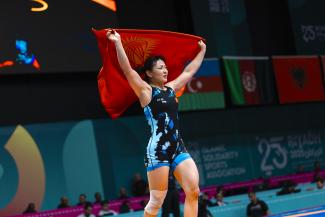
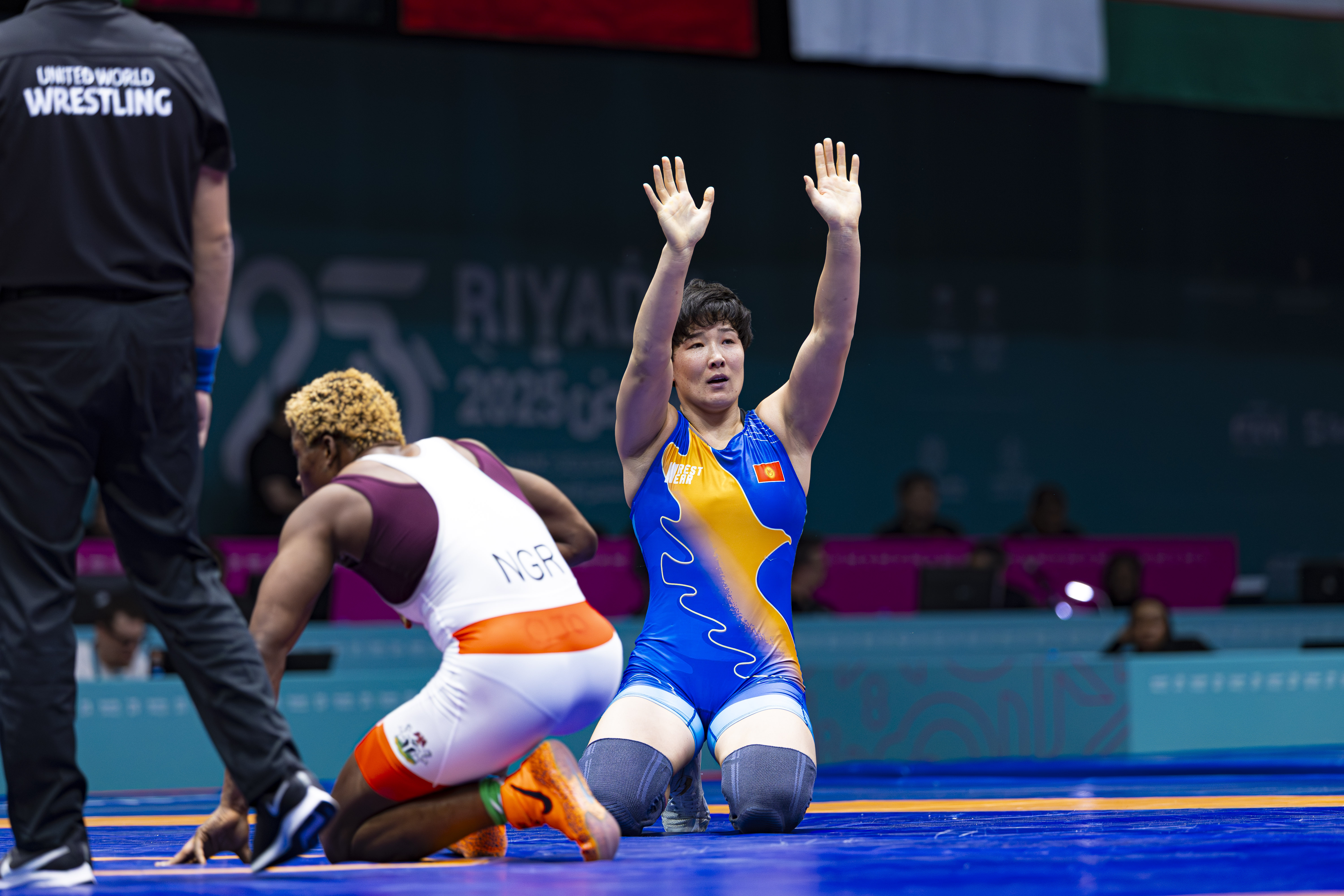 Aiperi MEDET KYZY (KGZ) celebrates after beating Damola OJO (NGR) in the 76kg final. (Photo: United World Wrestling / Kadir Caliskan)
Aiperi MEDET KYZY (KGZ) celebrates after beating Damola OJO (NGR) in the 76kg final. (Photo: United World Wrestling / Kadir Caliskan)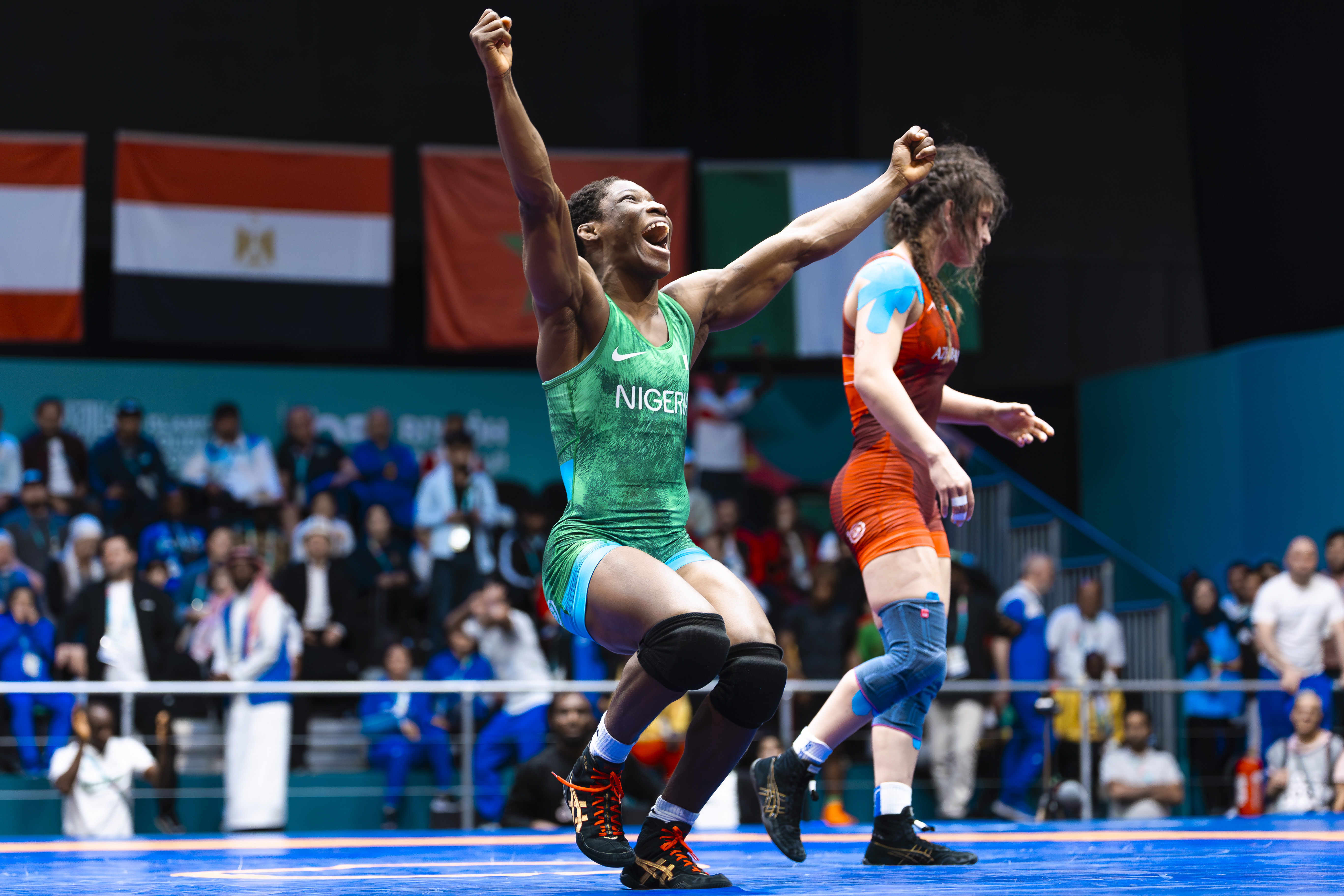 Esther KOLAWALE (NGR) defeated Ruzanna MAMMADOVA (AZE) with a last-second takedown in the 62kg final. (Photo: United World Wrestling / Kadir Caliskan)
Esther KOLAWALE (NGR) defeated Ruzanna MAMMADOVA (AZE) with a last-second takedown in the 62kg final. (Photo: United World Wrestling / Kadir Caliskan)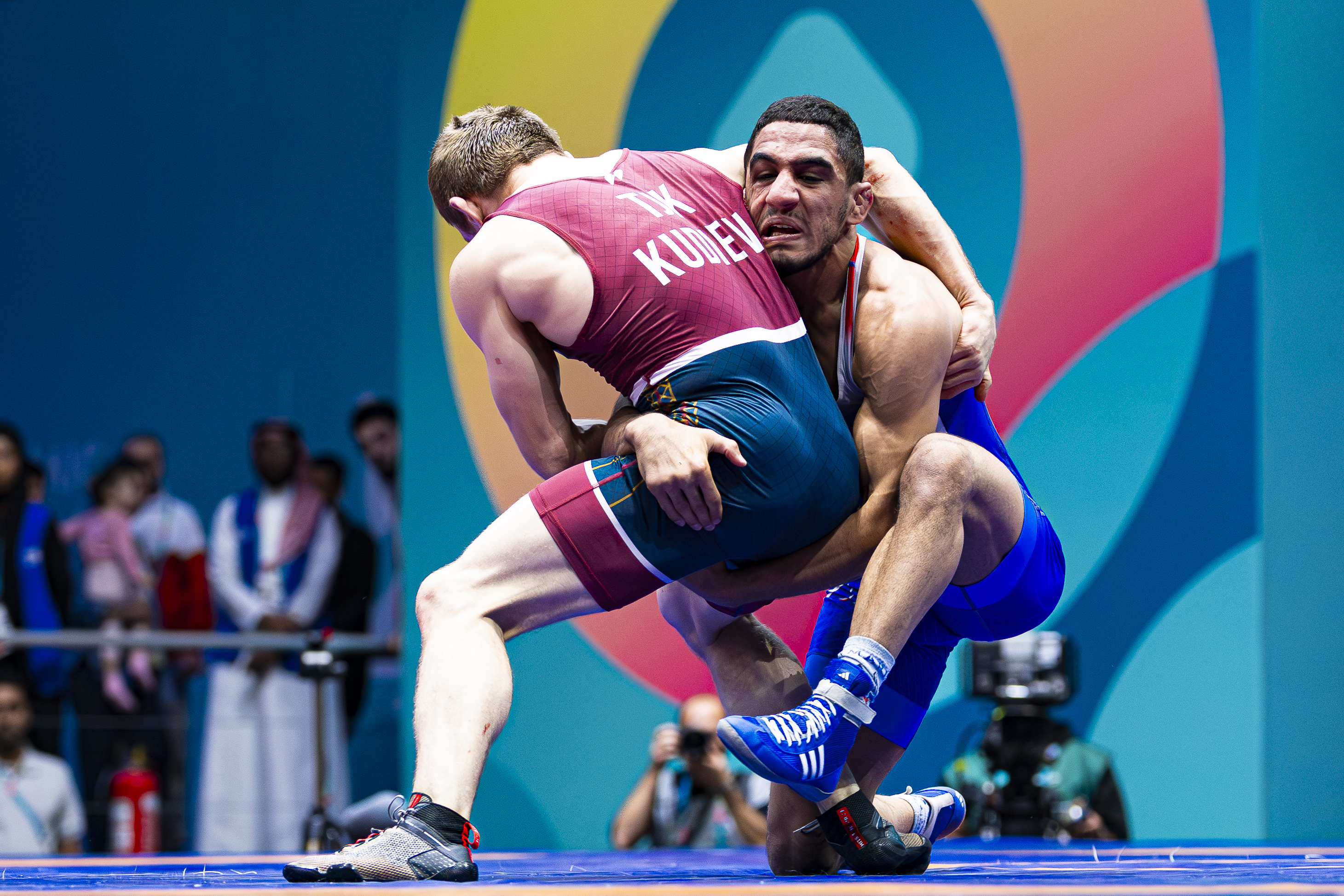 Rahman AMOUZAD (IRI) scores on Abdulmazhid KUDIEV (TJK) in the 65kg final. (Photo: United World Wrestling / Kadir Caliskan)
Rahman AMOUZAD (IRI) scores on Abdulmazhid KUDIEV (TJK) in the 65kg final. (Photo: United World Wrestling / Kadir Caliskan)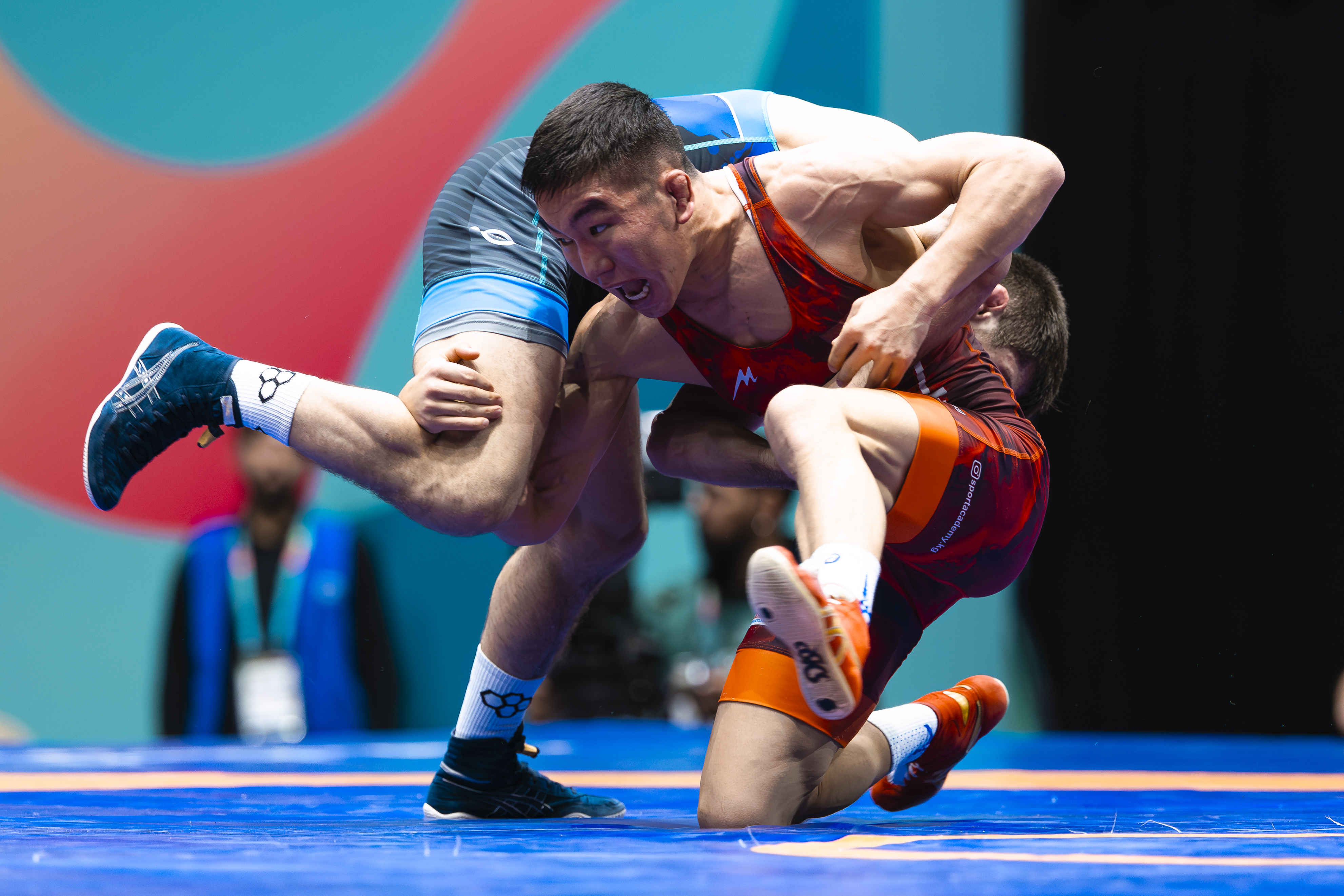 Abdumalik KARACHOV (KGZ) counters Islam BAZARGANOV (AZE) to score four points. (Photo: United World Wrestling / Kadir Caliskan)
Abdumalik KARACHOV (KGZ) counters Islam BAZARGANOV (AZE) to score four points. (Photo: United World Wrestling / Kadir Caliskan)
Share your thoughts.
Comments